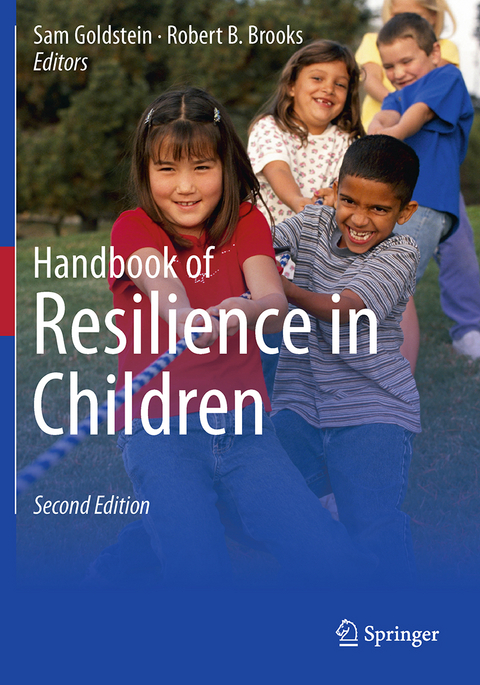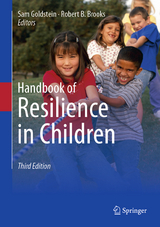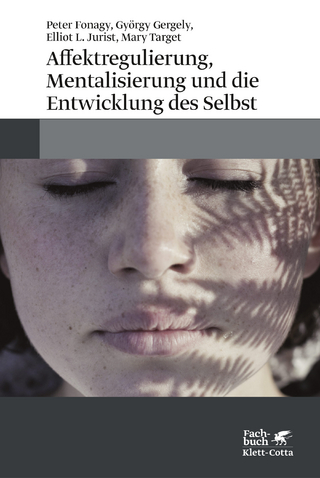
Handbook of Resilience in Children
Springer-Verlag New York Inc.
978-1-4899-7556-0 (ISBN)
Today’s children face a multitude of pressures, from the everyday challenges of life to the increasing threats of poverty, exploitation, and trauma. Central to growing up successfully is learning to deal with stress, endure hardships, and thrive despite adversity. Resilience – the ability to cope with and overcome life’s difficulties – is a quality that can potentially be nurtured in all young people.
The second edition of the Handbook of Resilience in Children updates and expands on its original focus of resilience in children who overcome adversity to include its development in those not considered at risk, leading to better outcomes for all children across the lifespan. Expert contributors examine resilience in relation to environmental stressors, as a phenomenon in child and adolescent disorders, and as a means toward positive adaptation into adulthood. New and revised chapters explore strategies for developing resilience in the family, the therapist’s office, and the school as well as its nurturance in caregivers and teachers.
Topics addressed include:
Resilience in maltreated children and adults.
Resilience and self-control impairment.
Relational resilience in young and adolescent girls.
Asset-building as an essential component of treatment.
Assessment of social and emotional competencies related to resilience.
Building resilience through school bullying prevention programs.
Large-scale longitudinal studies on resilience.
The second edition of the Handbook of Resilience in Children is a must-have reference for researchers, clinicians, allied practitioners and professionals, and graduate students in school and clinical psychology, education, pediatrics, psychiatry, social work, school counseling, and public health.
Sam Goldstein, Ph.D., is a doctoral level psychologist with areas of study in school psychology, child development, and neuropsychology. He is licensed as a psychologist and certified as a developmental disabilities evaluator in the State of Utah. Dr. Goldstein is a Fellow in the National Academy of Neuropsychology and American Academy of Cerebral Palsy and Developmental Medicine. Dr. Goldstein is an Assistant Clinical Instructor in the Department of Psychiatry. Since 1980, Dr. Goldstein has worked in a private practice setting as the Director of a multidisciplinary team, providing evaluation, case management, and treatment services for children and adults with histories of neurological disease and trauma, learning disability, adjustment difficulties, and attention deficit disorder. Dr. Goldstein is on staff at the University Neuropsychiatric Institute. He has served as a member of the Children’s Hospital Craniofacial Team. He has also been a member of the Developmental Disabilities Clinic in the Department of Psychiatry at the University of Utah Medical School. Dr. Goldstein has authored, co-authored or edited 36 clinical and trade publications, including 13 text books dealing with managing children's behavior in the classroom, genetics, attention disorder and adult learning disabilities. With Barbara Ingersoll, Ph.D., he has co-authored texts dealing with controversial treatments for children’s learning and attention problems and childhood depression. With Anne Teeter Ellison, he has authored Clinician’s Guide to Adult ADHD: Assessment and Intervention. With Nancy Mather, Ph.D., he has completed 3 texts for teachers and parents concerning behavioral and educational issues. With Michael Goldstein, M.D., he has completed two texts on attention deficit hyperactivity disorder. He has edited 3 texts with Cecil Reynolds, Ph.D., on neurodevelopmental and genetic disorders in children. With Robert Brooks, Ph.D., he has authored 11 texts including, Handbook of Resilience in Children, Understanding and Managing Children’s Classroom Behavior – 2nd Edition, Raising Resilient Children, Nurturing Resilience in Our Children, Seven Steps to Help Children Worry Less, Seven Steps to Anger Management, The Power of Resilience, Raising a Self-Disciplined Child and Raising Resilient Children with Autism Spectrum Disorders. With Jack Naglieri and Sally Ozonoff, Ph.D., he has authored a number of texts on autism, assessment of Intelligence and Executive Functioning. He has co-authored a parent training program and is currently completing a number of additional texts on resilience, ADHD and genetics. Dr. Goldstein is the Editor-in-Chief of the Journal of Attention Disorders and serves on 7 Editorial Boards. He is also the Co-Editor of the Encyclopedia of Child Development and Behavior. With Jack Naglieri, Ph.D., Dr. Goldstein is the co-author of the Autism Spectrum Rating Scales, Comprehensive Executive Functioning Inventory, Rating Scales of Impairment and the Cognitive Assessment System – 2nd Edition. Dr. Goldstein, a knowledgeable and entertaining speaker, has lectured extensively on a national and international basis to thousands of professionals and parents concerning attention disorders in children, resilience, depression, adjustment and developmental impairments, autism, and assessment of brain dysfunction. Robert B. Brooks, Ph.D., has lectured nationally and internationally to audiences of parents, educators, mental health professionals, and business people on topics pertaining to motivation, resilience, self-esteem, family relationships, the qualities of effective leaders and executives, and balancing our personal and professional lives. He has also written extensively about these topics. He is the co-author with David Richman of The Charismatic Advisor: Becoming a Source of Strength in the Lives of Your Clients and author of The Self-Esteem Teacher. He is co-author with Dr. Sam Goldstein of the following books: Raising Resilient Children with Autism Spectrum Disorders; Raising Resilient Children; Nurturing Resilience in Our Children: Answers to the Most Important Parenting Questions; Seven Steps to Help Your Child Worry Less (with Kristy Hagar); Angry Children, Worried Parents: Seven Steps to Help Families Manage Anger (with Sharon Weiss); Seven Steps to Improve Your Child's Social Skills (with Kristy Hagar); Understanding and Managing Children’s Classroom Behavior: Creating Sustainable, Resilient Classrooms; The Power of Resilience: Achieving Balance, Confidence, and Personal Strength in Your Life (the latter focuses on resilience in adults); and Raising a Self-Disciplined Child: Help Your Child Become More Responsible, Confident, and Resilient. In addition, Dr. Brooks is co-author of a book with Drs. Mel Levine and Jack Shonkoff titled A Pediatric Approach to Learning Disorders and has written a sex education book for the young child called So That's How I Was Born! Drs. Brooks and Goldstein prepared a parenting video and curriculum about resilience and have produced a documentary "Tough Times, Resilient Kids" that was a finalist in the 23rd Telly Awards. Dr. Brooks received his doctorate in clinical psychology from Clark University and did additional training at the University of Colorado Medical School. He is on the faculty of Harvard Medical School and has served as Director of the Department of Psychology at McLean Hospital, a private psychiatric hospital. His first position at McLean Hospital was as principal of the school in the locked door unit of the child and adolescent program. He has a part-time private practice in which he sees children, adolescents, adults, and families and has appeared regularly on television shows in the Boston area as well as on national cable television. He completed a videotape and educational guide for PBS titled “Look What You’ve Done! Stories of Hope and Resilience” that focuses on self-esteem and resilience in children with special needs and participated in the production of two videotapes by Sunburst Communications, one about parenting children with learning and attentional problems and the other about developing responsibility in children. Dr. Brooks received a Gubernatorial Award for Distinguished Public Service for his work with the Governor's Alliance Against Drugs; as part of his contribution to the Alliance, he co-authored a pamphlet for parents about talking with children and adolescents about drugs. Dr. Brooks also received "Hall of Fame" awards from both CH.A.D.D. (Children and Adults with Attention Deficit Disorders) and the Connecticut Association for Children with Learning Disabilities for his work with special needs children and adolescents, a Special Recognition and Media Award from the Massachusetts Psychological Association, the Friends of Family Award from the Family Place, MA and the Mandy Overton Award from St. David's Child Development and Family Services, Minnetonka, MN for his work on behalf of children and families, The Lifetime Achievement Award from the Prentice School in Santa Ana, CA for his efforts on behalf of students with learning differences, the Distinguished Leadership Award from Learning Disabilities Worldwide in recognition of his contributions and commitment to the field of learning disabilities, and the Outstanding Educator Award for Mental Health Education from the New England Educational Institute, Pittsfield, MA. In addition, Dr. Brooks has served as a consultant to Sesame Street Parents Magazine.
Preface.- Part I: Overview.- Why Study Resilience; Sam Goldstein, Robert B. Brooks.- Resilience Processes in Development: Four Waves of Research on Positive Adaptation in the Context of Adversity; Margaret O’Dougherty Wright, Ann S. Masten, Angela J. Narayan.- Reconceptualizing Resilience; Howard B. Kaplan.- Resilience in Gene-Environment Transactions; Zhe Wang, Kirby Deater-Deckard.- Relational Resilience in Girls and Young Females; Judith V. Jordan.- What Can We Learn About Resilience From Large-Scale Longitudinal Studies?; Emmy E. Werner.- Part II: Environmental Issues.- Poverty in Childhood and Adolescence: A Transactional-Ecological Approach to Understanding and Enhancing Resilience in Contexts of Disadvantage and Developmental Risk; Robert D. Felner, Melissa L. DeVries.- Family Violence and Parent Psychopathology: Implications for Children’s Socioemotional Development and Resilience; Sara R. Jaffee.- Understanding and Promoting the Development of Resilience in Families; Susan M. Sheridan, Tara M. Sjuts, Michael J. Coutts.- Resiliency in Maltreated Children and Adults; Shadi Houshyar, Joan Kaufman, Melissa DeVries.- Part III: Resilience as a Phenomenon in Childhood Disorders.- Resilience and the Disruptive Disorders of Childhood; Sam Goldstein, Richard Rider.- From Helplessness to Optimism: The Role of Resilience in Treating and Preventing Depression in Youth; Karen Reivich, Jane E. Gillham, Tara M. Chaplin, Martin E.P. Seligman.- Resilience and Self-Control Impairment; Wai Chen, Eric Taylor.- Part IV: Assessment.- Measuring Resilience in Children: From Theory to Practice; Jack Naglieri, Paul A. LeBuffe, Katherine M. Ross.- Assessment of Social Emotional Competencies Related to Resilience; Jack Naglieri, Paul A. LeBuffe, Valerie Shapiro.- The Resiliency Scales for Children and Adolescents: Constructs, Research and Clinical Application; Sandra Prince-Embury.- Part V: Resilience in the Clinical and School Settings.- Resilience and Positive Youth Development: A Relational Developmental Systems Model; Richard Lerner, Jennifer P. Agans, Miriam R. Arbeit, Paul A. Chase, Michelle B. Weiner, Kristina L. Schmid, Amy Eva Alberts Warren.- A Resilience Framework for Treating Severe Child Trauma; David A. Crenshaw.- Resilience and the Child with Learning Disabilities; Nicole Ofiesh, Nancy Mather.- Promoting Educational Equity in Disadvantaged Youth: The Role of Resilience and Social-Emotional Learning Building Educational Opportunity; Jazmin A. Reyes, Maurice J. Elias, Sarah J. Parker, Jennifer Rosenblatt.- Resilience through Violence and Bullying Prevention in Schools; Jennifer Taub, Melissa Pearrow.- Caring for the Caregiver: Promoting the Resilience of Teachers; Mary Mackrain, Jennifer L. Fleming, Paul A. LeBuffe.- Enhancing Resilience in Classrooms; Beth Doll.- Creating a Positive School Climate: A Foundation for Resilience; Jonathan Cohen.- Part VI: Shaping the Future of Children and Adults.- Positive Adaptation, Resilience and the Developmental Asset Framework; Arturo Sesman, Jr., Marc Mannes, Peter C. Scales.- The Power of Parenting; Robert B. Brooks.- Building Resilience in Children: A Public Health Approach; Emily B. Winslow, Irwin N. Sandler, Sharlene A. Wolchik, Colleen Carr.- Enhancing the Process of Resilience Through Effective Thinking; Myrna B. Shure, Bonnie Aberson.- Part VII: Conclusions.- The Future of Children Today; Robert B. Brooks, Sam Goldstein.
| Zusatzinfo | 20 Illustrations, black and white; XXI, 527 p. 20 illus. |
|---|---|
| Verlagsort | New York |
| Sprache | englisch |
| Maße | 178 x 254 mm |
| Themenwelt | Geisteswissenschaften ► Psychologie ► Entwicklungspsychologie |
| Geisteswissenschaften ► Psychologie ► Klinische Psychologie | |
| Medizin / Pharmazie ► Medizinische Fachgebiete ► Psychiatrie / Psychotherapie | |
| Sozialwissenschaften ► Pädagogik ► Sozialpädagogik | |
| Sozialwissenschaften ► Soziologie | |
| ISBN-10 | 1-4899-7556-X / 148997556X |
| ISBN-13 | 978-1-4899-7556-0 / 9781489975560 |
| Zustand | Neuware |
| Informationen gemäß Produktsicherheitsverordnung (GPSR) | |
| Haben Sie eine Frage zum Produkt? |
aus dem Bereich



